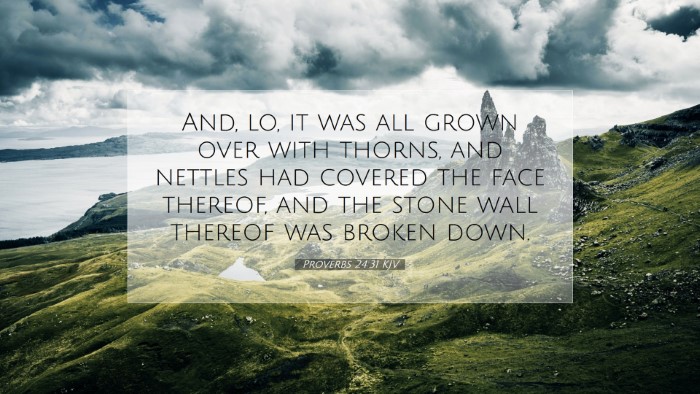Commentary on Proverbs 24:31
Proverbs 24:31 states: "And, lo, it was all grown over with thorns, and nettles had covered the face thereof, and the stone wall thereof was broken down." This verse presents a vivid image of neglect and the consequences of inaction. The insights found in various public domain commentaries, such as those by Matthew Henry, Albert Barnes, and Adam Clarke, provide a comprehensive examination of its implications and applications.
Contextual Overview
The book of Proverbs was primarily written to impart wisdom. This verse falls within a section that addresses the theme of diligence versus slothfulness. The wise author contrasts the consequences of neglecting responsibilities with the rewards of diligent labor.
Commentary Insights
Matthew Henry's Perspective
Matthew Henry emphasizes the significance of diligence in both physical and spiritual endeavors. He interprets the vineyard in Proverbs 24:31 as a metaphor for one's life or spiritual condition. The thorns and nettles represent the results of neglect; they symbolize sin, idleness, and spiritual decay. Henry warns that just as a neglected field becomes overgrown and unmanageable, so too does a life that is not cultivated in righteousness.
Albert Barnes' Interpretation
Albert Barnes highlights the importance of vigilance and careful attention to one's responsibilities. He notes that the phrase "all grown over with thorns" signifies a lack of care, leading to deterioration. Barnes points out that the stone wall, once a protective barrier, signifies the loss of defense against external threats. This can be reflective of spiritual protections that erode when individuals fail to guard their hearts. Barnes encourages readers to be proactive in maintaining their spiritual lives and not allow complacency to set in.
Adam Clarke's Analysis
Adam Clarke provides a detailed analysis of thorns as symbols of sin. He suggests that the thorns represent the adversities and troubles in life that stem from neglecting moral duties. Clarke stresses the need for continual effort and responsibility in guarding the "vineyard" of one's heart and life. He points out that the broken stone wall symbolizes vulnerability to outside influences, indicating that a spiritually idle mind is open to temptations and fallacies, which can easily infiltrate one's life.
Theological Reflections
This verse is a stark reminder of the spiritual and practical aspects of life. It calls for reflection on several key themes:
- Neglect: The dangers of spiritual apathy; when we fail to cultivate our lives in faith, we risk allowing negative influences to take root.
- Vigilance: An emphasis on the continual effort required to maintain spiritual health; diligence is a defense against spiritual decay.
- Consequences of Inaction: Just as neglect leads to thorns in the vineyard, so too does idleness in the spiritual realm lead to moral and ethical compromises.
- Restoration: While this verse illustrates consequences, it also invites reflection on the possibility and necessity of restoration through faith and active engagement in God's work.
Applications for Pastors and Theologians
For pastors and theologians, Proverbs 24:31 speaks to the essence of discipleship and leadership within the church. The imagery of a vineyard serves as a metaphor for nurturing congregational growth:
- Encouragement of Accountability: Leaders must encourage personal accountability among congregants to cultivate their spiritual lives.
- Teaching on Diligence: Pastors can use this verse to instruct on the importance of active faith, reminding the congregation that spiritual growth requires work.
- Community Engagement: This verse calls for collective participation—communities must work together to maintain spiritual health rather than leaving it to individuals alone.
- Restorative Ministry: Just as a field can be reclaimed, churches must promote restorative practices for those who have fallen into neglect.
Conclusion
The vivid imagery contained in Proverbs 24:31 serves as a powerful reminder of the implications of neglect in our lives. Drawing from the insights of Matthew Henry, Albert Barnes, and Adam Clarke, we are encouraged to see the importance of diligence, vigilance, and communal responsibility in maintaining the richness of our spiritual journeys. The metaphor of the vineyard beckons us to actively engage in the cultivation of our lives, ensuring that we are not overtaken by thorns and nettles, but rather flourish in the grace and knowledge of Christ.


